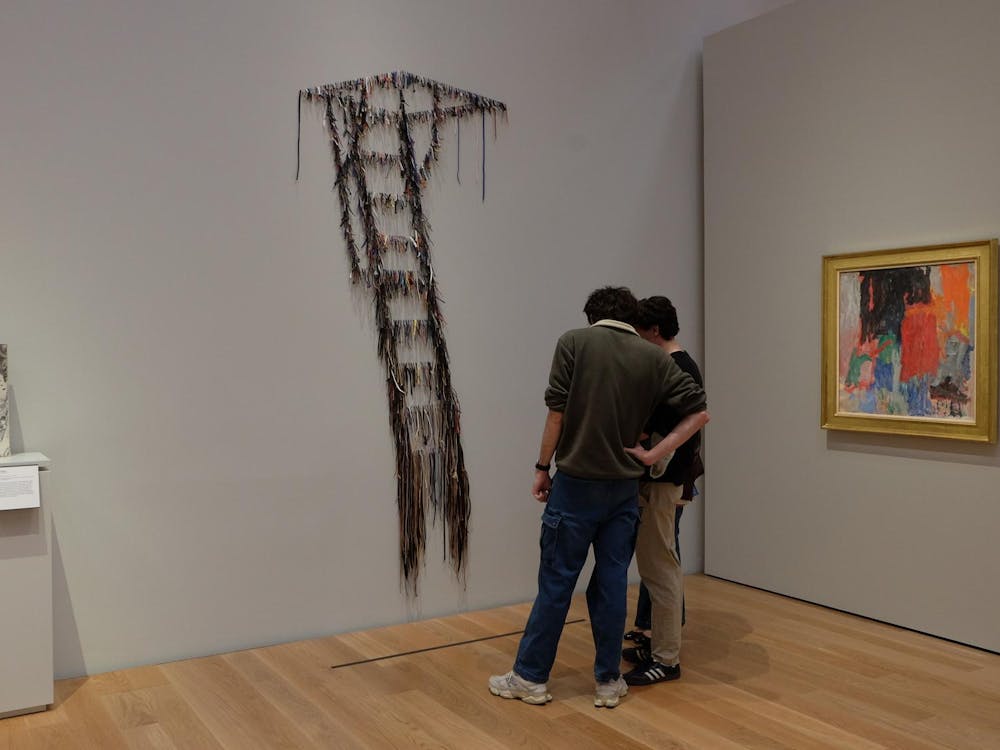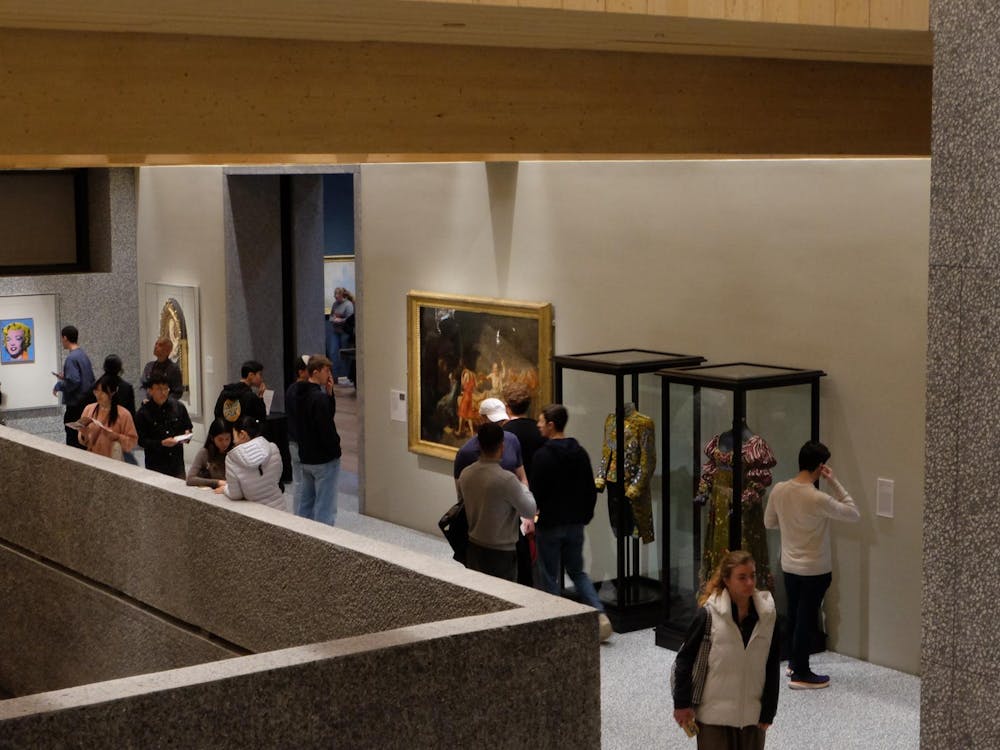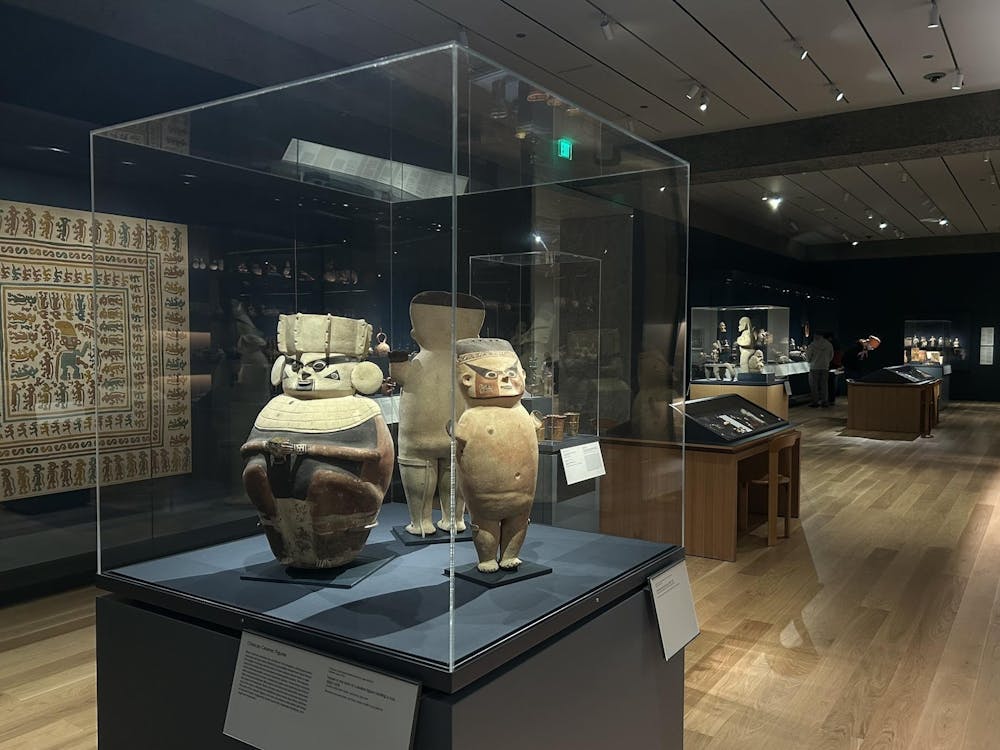A group calling itself the Order of the Bull's Blood, a secret society at Rutgers University, is claiming responsibility not only for the spate of recent vandalism of Princeton property, but also for the theft of one of the University's cannons in 1875.
The group, which also goes by the name Lodge 443, says its goals are twofold: first, to return the cannon to Rutgers and second, to have another Princeton-Rutgers football game.
"It's the oldest tradition," a member of the group told The Daily Princetonian, referring to the first intercollegiate football game. "This is the birthplace of college football. This is the game that really matters."
After being approached by the source, a 'Prince' reporter met with him earlier this month to discuss why Rutgers students had vandalized the cannon behind Nassau Hall and other Princeton property. Students, allegedly from Rutgers, twice vandalized Princeton property this year, tagging the cannon and Whig and Clio halls with graffiti.
The source, referred to here as Joseph, after one of the purported founders of the group, provided his name to the 'Prince' and spoke candidly on the condition that he not be identified publicly. "Everybody calls me when there are problems," Joseph, a stocky, brown-haired man dressed in a tie and jacket, said during a two-hour conversation.
"I was asked if I could go down and sort of mediate some of the storm, because they didn't know how much of a backlash that would cause," he said, alluding to the reference in a 'Prince' article about the newspaper tracing an email sent by an alleged vandal to a Rutgers student's network account.
The wide-ranging conversation with Joseph, now a Rutgers alumnus and member of the Order's executive board, revealed a picture of a group of young men deeply dedicated to re-instigating a historic rivalry between Princeton and Rutgers. The Order, as Joseph repeatedly called it, "sees itself as a guardian of tradition."
In that role, however, Princeton is just part of its focus. The group, which Joseph said was founded as a secret society in 1834, is dissatisfied with much of what has happened at Rutgers in the past century, particularly the school's apparent decline from one with many proud traditions to being another state school, albeit one of the better ones in the country. He said the group was willing to publicly discuss its activities in the hopes of winning support for a football game.
"Tradition is a wonderful thing," Joseph said. "You've got a university that walked away from becoming a private institution back in the '40s, and a lot of traditions after Rutgers became a state university have gone by the wayside."
History in doubt
Ever since the Revolutionary War, Princeton and Rutgers have both laid claim to the cannon now buried in concrete behind Nassau Hall. The rivalry began when Princeton townsfolk brought the large cannon back from New Brunswick in 1835.
Rutgers students, taunted by Princetonians, stole back a cannon in 1875, though they mistakenly took the smaller one that now sits in front of Whig Hall. The theft made national news, garnering a mention in The New York Times. The cannon was finally returned after negotiations between the presidents of Princeton and Rutgers.
Joseph said that the majority of the efforts to steal back the cannon since it was returned to the University over 100 years ago were by members of Lodge 443. "Back in 1875 it was our guys who stole the cannon," Joseph said. "They've always wanted it back. There have been a good 500 variations of how to pull it out of the ground and such since you guys have it encased in concrete."

Whether Joseph's account of the group's history is true remains in doubt, however. Beside the claims that the group was responsible for the theft of the cannon in 1875 and repeated vandalism in the decades since, Joseph said the group's five founders included U.S. Secretary of State Frederick Frelinghuysen and New Jersey Governor and vice presidential candidate William Newell, both members of the Rutgers Class of 1836.
Other alleged former members of the group include Ozzie Nelson, the musician and actor; Milton Friedman, the Nobel Prizewinning economist; Louis Freeh, former director of the Federal Bureau of Investigation; and Robert Torricelli, a former U.S. senator for New Jersey.
The 'Prince' made several attempts to contact the alleged members but received no response.
Erika Gorder, an archivist at Rutgers, said in an email that the university has had "questions about [the group] in the past and has said there is no evidence that this organization existed."
"We suspect that the organization (I use this term loosely) may exist now, but they have created their own fictional/mythical past," she said.
Gorder said Rutgers officials had spoken with William Hughes, a former U.S. ambassador and congressman about whether he knew about the Order, of which he is said to have been a member. Hughes, Gorder recalled, "laughed and said that he definitely was not a member, nor ever heard of such an organization."
"I really do believe they have a fictionalized history or this is a hoax," Gorder added. "There is no mention of them in the historical record. Of course, it is rather tough with a society that is supposed to be secret."
While rumors of the group have been mentioned by other sources over the years, the only credible, independent confirmation of the group's existence is an article written in 2001 by Spencer Ackerman, a former editor at the Rutgers student paper The Daily Targum and now an editor at The New Republic, a well-known Washington policy magazine.
"There was this really annoying, annoying fellow who would occasionally write articles for me," Ackerman recalled in a recent interview with the 'Prince.' One day this student pulled Ackerman aside. "He sticks one of his pudgy fingers on my shoulder and starts jabbing me. He says, 'Bull's Blood, accept or reject.' I think I just started giggling at him."
Ackerman said he decided to use the invitation as material for a news feature and showed up at the first gathering of his fellow tapped juniors. He discovered that Vikram Tank, editor-in-chief of The Daily Targum, had been tapped as well. "We were sort of shooting looks at one another, like, what the f—k?"
The "pledges" were told to perform a prank. Ackerman and Tank, who could not be reached for comment, were driven to Princeton by the same man who tapped Ackerman and told to steal a statue of a Native American that stood outside a store. The statue had been moved inside, however, and the party "drove back completely unsuccessful."
"The rationale for this action was that Bull's Blood for generations was involved in acts of subterfuge and sabotage," Ackerman said. "The Princeton kids deep in the battle of history stole one of the cannons. Bull's Blood secretly existed to retaliate for this ancient offense."
He published his account of these events and was subsequently told by a member of the Order that he had made the "biggest mistake of his life," that he would be "blackballed," that he could be "sued for disclosing the contents of this meeting" and that he should "watch himself."
Ackerman's response: "I just told him what a d—chebag he was, basically."
"I don't think they exist," he added. "I suppose that there's some kind of organization that uses this thing as a pretext for whatever ridiculous social activity they seek to indulge in, but in terms of this thing's history I find it completely implausible and I think were it true, it's completely pathetic."
"I should mention that while I can't foresee what horrors should befall me later in my career, I'm an associate editor of The New Republic. I think I'm doing pretty well."
'Brotherhood'
Ackerman's account aside, Joseph said he and the members of the Order take their membership and mission seriously. "The entire group has this idea that we are the only people who hold up traditions that other people seem to ignore," he said.
Ironically, the Order is dissatisfied with what it says is the growing population of athletes and the diminishing number of scholarly and intellectual groups on campus. "I got a 1490 on my SAT and I'm sitting next to a guy who got in only because he can run a ball," Joseph said. "Certain things like that tarnish your accomplishments when you try to compare yourself with lesser mental ability."
Members of the all-male Order tend to be very conservative — few Democrats, Joseph said, have been let in. Jews were first tapped to be in the Order in the 1920s, African-Americans in the '70s and '80s, and the first and only Asian member was tapped in 2002. No openly gay men have ever been allowed in the club.
"The alumni would go crazy," Joseph said of the possibility that a member may be gay. Were a member to come out, "that would probably be the only time somebody has ever been expelled."
Homophobia isn't the only form of discrimination endorsed by the group. "If you actually hang out with a lot of the members, especially the members now, you'll hear them use the phrase n—ger and jig—boo all the time, shouting out of cars at black people on the street and stuff like that," Joseph said, noting that he wasn't "a racist or anything like that," but that he too used both words from time to time.
Like most fraternities and societies, the Order, which "taps" roughly a dozen students each year, encourages close friendship. "It's more brotherhood than anything," Joseph explained. "It really does build good bonds. The bonds of brotherhood will never die."
"It made me a better man," he added. "I think that connection with 11 other guys, that sort of brotherhood really improved you as men. It makes you dedicated to a certain group of people who are equally as dedicated to you as you are to them. You don't see a lot of that anymore."
Members share several things in common, including school spirit, participation in academic curricular activities — and a penchant for theft. "It's incessant kleptomania," Joseph said. He also owned up to breaking into cars and houses when he was younger. "I have a thing for chaos. I love anarchy."
"One of the personality types that is pointed out for membership is risk-taking. A lot of the guys who get into this really know what they're doing when it comes to certain criminal activity," Joseph said. "How do you expect 12 guys running around Princeton in front of three Public Safety officers in cars and pull off a massive vandalism in just a couple days."
"You have to have a certain amount of ability to get away with that."
The homogeneity of the club is not entirely accidental. Joseph conceded that, "You could look at it as sort of a mini-brain washing," of which he was a "willing participant."
Members are sworn never to admit membership to the Order. They are to deny knowledge that such an order even exists if they are ever asked. Members pride themselves on the secrecy and mystery surrounding the club.
"It becomes attractive because of the amount of secrecy," Joseph said. "A lot of people know in their hearts that it exists but they sort of wonder."
Being in the shadows also helps members avoid the consequences of their illegal activities. When authorities try to investigate crimes, they are "grabbing at air," Joseph said.
Vandals
Joseph said the Order performs roughly 20 to 30 pranks and other acts of vandalism on Princeton's campus each year — each with the purpose of instigating Princeton students to retaliate and eventually acquiesce to the notion of a Princeton-Rutgers football game. "The end result," Joseph said, "is something that is beneficial in the long run."
"There was a big debate" among the members, however, after the group's most recent act of vandalism referred to Princeton students as "fa—gots."
It was "a little too vulgar," Joseph said. "The organization tries to show itself off as being a little bit more classy than the typical Rutgers fare. So it's going to be something a lot smarter."
"There's a set of rules saying if you're going to go down and vandalize Princeton, these are the set rules and you can't vary from these rules," Joseph explained.
"Some of the stuff that happened the other day did go past these rules. For instance, vandalizing the two tigers was completely against rules. If you're going to go after the cannons, you go after the cannons. If you're going to vandalize something, at least vandalize the ground, something that's washable."
Though he admitted that the message was in poor taste, Joseph said that a lot of the current members are being congratulated by the group's alumni for their good work.
"There's a lot of backslapping going on right now. Last night they would've had a dinner meeting and I haven't heard anything about it, but there was probably a lot of alumni there saying 'Good job, keep it up.' "
Were Princeton students not to respond to the increasing provocation, "they'd keep on trying to escalate it," Joseph said of the Order. "It's sort of a Catch 22. If you guys come up and do a little bit of vandalism, we up the ante a bit more and do something a little bit more exaggerated than the previous one."
Joseph also alluded to members escalating the pranks to a level rarely seen in recent years. "I think there are people who are half tempted to go completely full hog at something."
"You'll see something on national TV soon," Joseph said, hinting that it might be during the Rutgers-University of Connecticut game on Oct. 29.
"There's a whole bunch of weird ideas."







